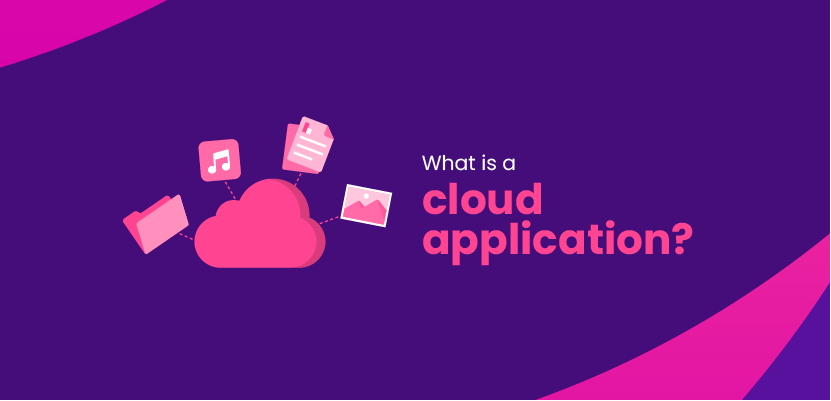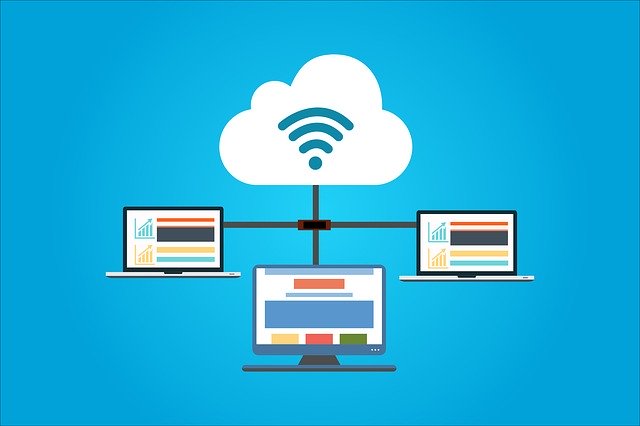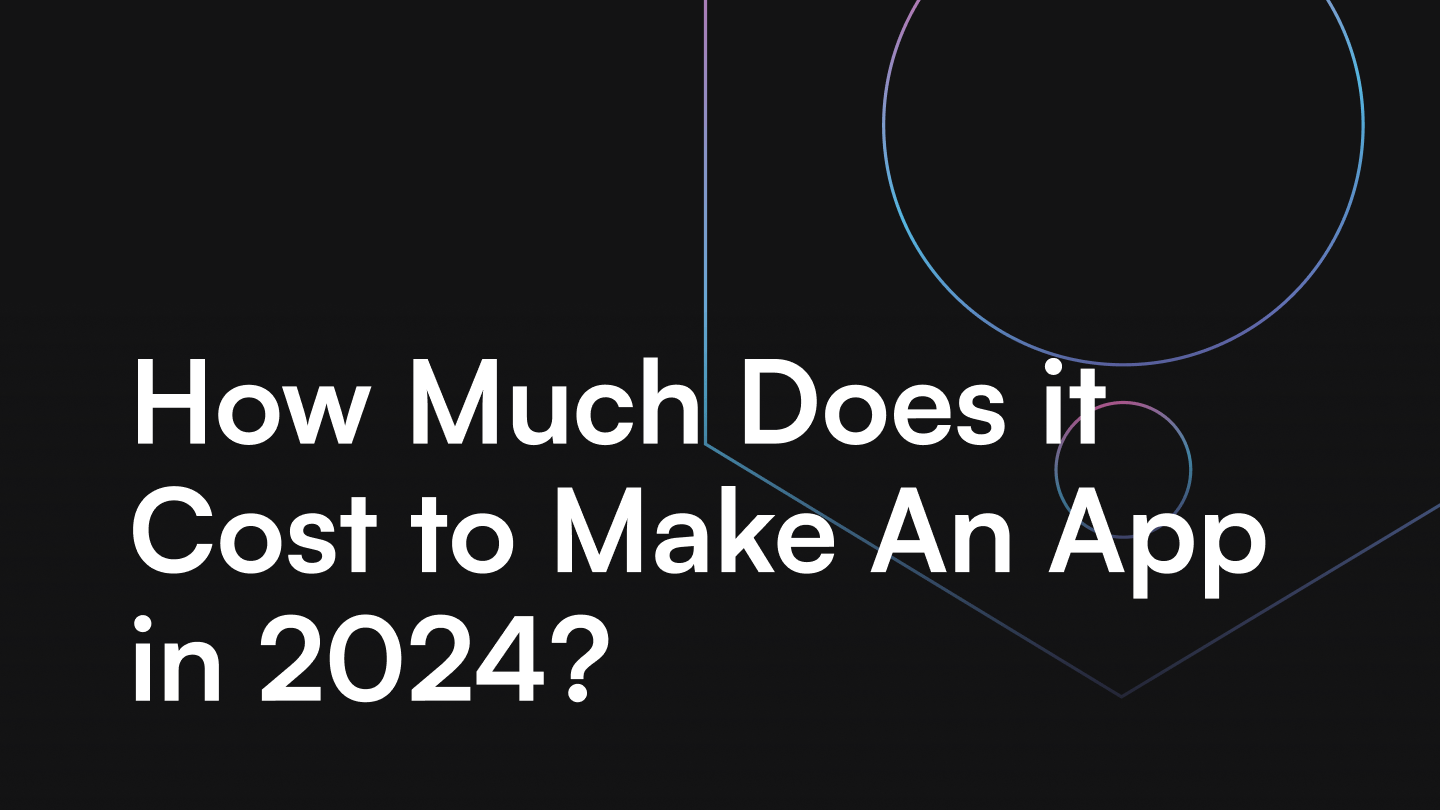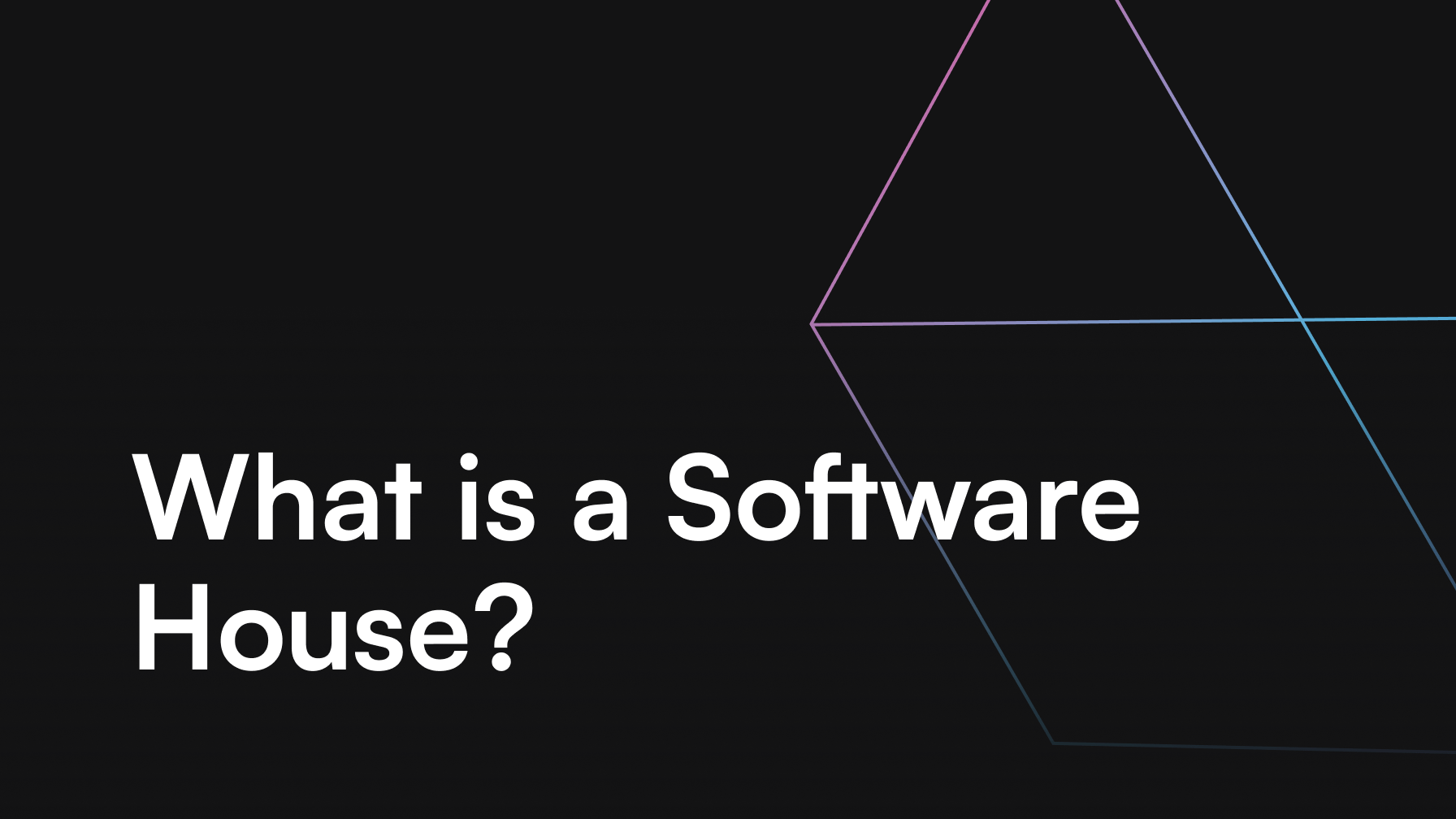What is a cloud application?

Alexa Trachim

You probably heard the word “cloud” in the context of some IT products and services. Most of us use a cloud application like Google Drive or Dropbox to store files and share them with others. Today we will take a closer look at cloud applications to see how they are developed, what their purpose is and why they can be a viable choice for business.
Spis treści
- What is meant by cloud application?
- Who can be a cloud developer?
- What is the difference between web applications and cloud applications?
- The benefits of cloud-based application development
– Cost-effectiveness
– Short time-to-market
– Scalability
– Availability
– Easy data sharing
– Security - What are the cloud application development platforms?
– Google Cloud Platform
– Microsoft Azure
– Amazon Web Services (AWS)
– Alibaba Cloud - The difference between a private cloud and public cloud
– Private cloud
– Public cloud
– Hybrid cloud - What is a cloud-native app?
- What is an example of a cloud-based application?
– Facebook, LinkedIn, Instagram and more
– Netflix
– Skype, Whatsapp and email
– Siri, Alexa and Google Assistant
– Software as a Service (SaaS)
– Dropbox and Google Drive
– Google Docs and Microsoft Office 365
– Application development and testing
– Big data - Should you invest in a cloud application?
What is meant by cloud application?
A cloud application is a piece of software that connects local components with cloud-based ones. The latter are provided by a third-party company that shares its servers capacity in the online environment.

Why some companies choose cloud services instead of creating their own servers base? Usually, it’s because they don’t want to build their own infrastructure, but their apps need to process lots of data that requires high computing power. Paying for cloud services is much more convenient than building their private data centers.
Which industries can benefit from cloud development? Almost all of them. E-commerce, financial companies and banks, innovators that use artificial intelligence, internet of things and other modern technologies to enhance their products or services. Also, every other brand and startup that needs a system or a platform that will make their day-to-day operations simplified.
Who can be a cloud developer?
Currently, the average cloud application developer salary oscillates around $70 000. This position is becoming more and more popular – because there’s a demand for complex applications that can do lots of things.
Cloud developer needs to have specific skills and extensive knowledge of cloud-related concepts. Add previous experience in common development frameworks and the constant craving to learn more. That’s a lot of expertise to have, so the compensation needs to be adequate.
As you will see below, cloud computing can sometimes be complicated and it requires the right approach. Understanding of complex mechanisms and rules is a must, a bit of creativity also won’t hurt anyone.
What is the difference between web applications and cloud applications?
Basically, a web application can refer to any type of application that can be accessed via a web browser. It is a term that describes a lot of different products. What’s important is that web applications can be accessed only when there’s an internet connection. All the data is stored on the servers that belong to the host. Usually, the company that owns the web app. Compared to a cloud application, a web application has much lower scalability.

Cloud application, on the other hand, can be accessed without a browser. Its main advantage is the fact that it can operate while being offline since data is cached locally and it’s synchronized when the user restores internet connection. The host doesn’t require to have their own servers, as the cloud owner stores the information. That also means it’s much more scalable because the server capacity can be extended at any time.
The benefits of cloud-based application development
There are many advantages of cloud computing that cause brands to choose these systems for their applications. Here’s a couple of them.
Cost-effectiveness
Cloud providers offer very competitive prices due to a multitude of available solutions. Also, as mentioned above, it is much cheaper to use cloud infrastructure than building an in-house data center from scratch.
Short time-to-market
Application development on the cloud takes much less time than building native or hybrid platform. Introducing updates and fixes is also quick and easy. So if you want to release your product fast – maybe cloud is for you.
Scalability
If a need to process more data occurs, adding more capacity can be done almost instantly. Cloud computing services are highly scalable. They can be a perfect choice for every company that grows quickly and needs to update its features ASAP.
Availability
Building apps for different operating systems is easy and cheap with the cloud. If we need a tool to share information across devices and platforms – that is the remedy.
Easy data sharing
Files shared on the cloud are available instantly to everyone with access. It can be beneficial for every big business that relies on a lot of data. Sharing files, documents and presentations with co-workers, vendors and clients is effortless with cloud service.
Security
Cloud service providers can afford the best safety procedures because they offer services to a large pool of clients. A small enterprise or a startup won’t be able to provide such a level of security.
What are the cloud application development platforms?
Cloud application development services are platforms that provide all the resources for the creation, management, testing and deployment of cloud applications. We recommend using the biggest, most popular ones as they offer great support, reliability and integration with many components and services. Many developers and organizations trust these service providers because they are highly-reviewed business partners.
Google Cloud Platform
Digital giant Google offers cloud computing software with multiple capabilities. It is not only a storage space or a network for vendors, but it also cooperates with such technologies as machine learning or the internet of things (IoT). Cloud services by Google give devs a lot of possibilities to create robust systems and applications.
Microsoft Azure
This cloud infrastructure is using a data center owned by Microsoft – which means it is especially often used by people who integrate other solutions from this company in their operations. It allows full application development in the cloud and gives control over deployed products.
Amazon Web Services (AWS)
Global e-commerce leader is also a service provider for cloud applications. It offers a system for data storage but also processing and analysis of it. Its business model is based on suited-to-requirements computing resources available to individuals, brands and governments.
Alibaba Cloud
Another established e-commerce organization that offers cloud services is Alibaba. At first, it was just a private cloud to manage all Alibaba Group data. But it evolved into external service that includes storage, hosting, big data analysis, AI and much more.
The difference between a private cloud and public cloud
We can distinguish three types of cloud computing: private, public and hybrid. What are they exactly?
Private cloud
Every company that owns its own data center can create cloud infrastructure for its employees. Instead of buying cloud space from a cloud provider, they can build their own private cloud where all the information is stored on internal servers.
The main drawback of this solution is that maintenance and the costs can be high. A need for better scalability means that at one point, we will have to buy new computers for our data center.
This type of solution can be great for big enterprises that want cloud computing services without sharing any software with other companies. Also, it can provide an even higher level of security.
Public cloud
In the public cloud, all the hardware is stored by a third-party cloud service. Mentioned above examples of public cloud computing services usually have big data centers because they understand scale is essential for their clients. Their needs can grow and change at any point, so they need to be prepared.
Services like AWS or Azure offer a couple of payment models, so their clients can pick the one that suits them best. Spending less money at the beginning of using cloud servers is a huge advantage. With time, we can either get more capacity or change to our own cloud.
The performance of established cloud computing services is nothing to be worried about. Every potential problem can be fixed with the help of customer support. Picking the public cloud is secure and viable for every business.
Hybrid cloud
You might already guess, that hybrid cloud is the mix between private and public. It uses on-premises servers as well as the external ones and connects them through a network to send data between them without more significant delays or issues. Using this type of cloud is often justified by the need to get public cloud attributes for our private cloud. Also, building apps in a hybrid environment gives us the possibility to gain all the benefits of both solutions.
What is a cloud-native app?
Cloud application development companies create a modern type of software using the cloud. Basically, native cloud applications are developed using all the capabilities of cloud services to achieve spectacular results.
A native cloud application is developed and deployed using cloud and it stays there instead of being moved to the internal data server of the app owner. When it comes to application development for cloud-native apps, the programmers use scalable components offered by the cloud, which allows them to build complex, flexible solutions.
Cloud-native application development brings lots of business value to anyone who decides to incorporate it into their operations. It enables quick application building. It also helps to improve the old ones and gives a possibility to connect both so that everything can work smoothly and seamlessly.
What’s crucial is that native cloud applications can be accessed from any device, wherever the user is. That can be an advantage for remote employees or companies with branches around the world – because everyone will see the exact same information, no matter where they are. We only need a computer, a web browser, or a program suited for the cloud we use and internet connection.
Every member of your team can share corporate files and display sales presentations when they visit a potential client. Investment in native cloud applications will be appreciated when you discover all the possibilities they offer.
What is an example of a cloud-based application?

So now you know what a cloud application is, what are the types and provides of cloud services and why cloud apps can be beneficial for all the businesses out there. Now, let’s take a closer look at some examples of cloud applications. You will be surprised how many popular desktop and mobile apps, as well as online tools you use every day, are cloud applications.
Facebook, LinkedIn, Instagram and more
Social media platforms are all cloud applications. They store a lot of personal data and provide their services to millions of people every day. That means they need a powerful data storage and hosting environments. Using a cloud is the perfect solution for them.
Netflix
Having lots of clients and streaming lots of videos on demand every day, it was an excellent move for Netflix to move from in-house infrastructure to the cloud. Expanding client base and saving money at the same time was possible. The company didn’t have to buy expensive equipment. Instead – they picked much cheaper cloud software.
Skype, Whatsapp and email
Communication has a vast potential to be moved to the cloud. These services need to deliver robust ways to chat, call and stream videos, send different types of content and much more. Billions of people use email every day. There’s no doubt that cloud is definitely a relief to every tool with that massive base of users.
Siri, Alexa and Google Assistant
Our fellow chatbots are AI-based cloud applications. Thanks to this type of computing, they can provide personalized experiences placed in context and based on natural language.
Software as a Service (SaaS)
Business processes are based on lots of data, need for quick sharing and storage available for all. That’s why a lot of CRMs (customer relationship manager) or ERPs (enterprise resource planning) are based on the cloud. Creating ready-to-use software that can quickly help companies run their operations is a great way to make use of the cloud.
Dropbox and Google Drive
File storage and backup is probably the basic functionality that everyone associates cloud with. We usually upload our documents or pictures in there to have them with us at any time and place. But also to share them with our friends and family.
Google Docs and Microsoft Office 365
Some of us know these tools from work – because we can easily create documents, presentations and spreadsheets that will be available for anyone with access. These programs need to process data in real-time and store it online, so it can be open and edited at any point. Cloud is perfect for that.
Application development and testing
Cloud development can help to create software with time and cost-efficiency in mind. Whether it is a mobile, web, or cross-platform product – they will gain new possibilities, and the process of building, testing and deployment will definitely be simplified.
Big data
Cloud software can store and organize lots of data that can then be analyzed by specialists using open-source tools like Cassandra or Hadoop. Cloud is a must for every organization that collects and processes lots of information.

Should you invest in a cloud application?
As you can see, cloud applications can do a lot of things. They are especially beneficial for companies that work with documents, files and other types of content that need to be stored, edited, accessed and shared at all times. Also, consider developing a cloud application if your brand has lots of clients that interact with each other, create videos, communicate via chat or calls and have diverse needs that may require a powerful digital engine to process them.
Is your product based on mobile or web? Dedicated to internal needs or intended to be released externally? That doesn’t matter. Cloud development gives you countless possibilities to build the product of your dreams with a smaller budget and a shorter timeline.
If you need advice or more information about cloud-based solutions – contact us and let’s discuss your business goals. We can help you decide whether the cloud is for you or not. Also, we can create a cloud app for every project you have in mind. What will be the outcome of our collaboration? Find out yourself!
You may also like
How much does it cost to make a booking type app?
How Much Does it Cost to Outsource App Development in 2020?
Top 4 technologies to develop your app in 2021





